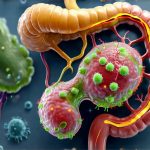Irritable Bowel Syndrome (IBS) is a common gastrointestinal disorder characterized by abdominal pain, bloating, gas, diarrhea, and/or constipation. These symptoms can significantly impact an individual’s quality of life, leading to discomfort, anxiety, and social limitations. While there’s no single cure for IBS, management strategies often involve dietary modifications, stress reduction techniques, and, increasingly, exploration into the role of gut microbiota and interventions like probiotics. Understanding the complex relationship between the gut microbiome and IBS symptoms is crucial for informed decision-making regarding potential supportive therapies.
The gut microbiome—the vast community of microorganisms residing in our digestive tract—plays a vital role in overall health, including digestion, immunity, and even mental well-being. In individuals with IBS, imbalances within this microbial ecosystem are frequently observed. This imbalance, known as dysbiosis, can contribute to heightened sensitivity, altered motility, and increased inflammation, all of which exacerbate IBS symptoms. Probiotics, live microorganisms intended to benefit the host when consumed in adequate amounts, have emerged as a potential avenue for restoring gut balance and alleviating some aspects of IBS.
Understanding the Gut-Brain Connection in IBS
IBS isn’t just about the gut; it’s deeply intertwined with the brain through what’s known as the gut-brain axis. This bidirectional communication system involves neural, hormonal, and immunological pathways. Alterations in the gut microbiome can influence these pathways, leading to increased visceral hypersensitivity—an amplified perception of pain from the intestines. Dysbiosis may also impact mood and psychological factors like anxiety and stress, which are often associated with worsening IBS symptoms. Probiotics aim to modulate this axis by influencing microbial composition and potentially reducing inflammation, thereby impacting both physical and emotional well-being.
The Role of Probiotics in Modulating Gut Microbiota
Probiotics aren’t a one-size-fits-all solution for IBS because the gut microbiome is incredibly personalized. Different strains of probiotics have different effects, and what works for one individual may not work for another. Many studies focus on specific strains like Bifidobacterium infantis 35624, Lactobacillus rhamnosus GG, and various Lactobacillus plantarum strains, demonstrating varying degrees of success in reducing IBS symptoms. The mechanisms through which probiotics exert their effects are multifaceted, including competition with harmful bacteria, strengthening the gut barrier function, and producing beneficial metabolites like short-chain fatty acids (SCFAs).
Strain Specificity and Symptom Relief
The effectiveness of probiotic interventions is heavily dependent on strain specificity. For example, Bifidobacterium infantis 35624 has shown promising results in reducing abdominal pain, bloating, and overall IBS severity, particularly in women with diarrhea-predominant IBS (IBS-D). Conversely, other strains might be more effective for constipation-predominant IBS (IBS-C) or have minimal impact on specific symptoms. Research consistently emphasizes that broad claims about “probiotics” generally are insufficient; identifying the right strain(s) based on individual symptom presentation is essential.
Impact on Gut Barrier Function and Inflammation
A compromised gut barrier, often referred to as “leaky gut,” allows undigested food particles and bacteria to enter the bloodstream, triggering immune activation and inflammation. Probiotics can help strengthen the gut barrier by promoting tight junction protein expression, reducing intestinal permeability, and enhancing mucin production – a protective layer lining the intestine. By improving barrier function, probiotics may reduce systemic inflammation, which contributes to IBS symptoms like abdominal pain and bloating. Some strains also possess anti-inflammatory properties themselves, further mitigating immune responses.
Modulation of Gut Motility and Gas Production
IBS is often characterized by altered gut motility – either too fast (leading to diarrhea) or too slow (resulting in constipation). Certain probiotic strains can influence gut motility through various mechanisms, including the production of SCFAs that affect intestinal muscle contractions. Furthermore, imbalances in gut microbiota contribute to excessive gas production. Some probiotics help reduce gas production by altering bacterial fermentation patterns and promoting a healthier digestive process. The impact on motility and gas varies greatly between strains and individuals, highlighting the need for personalized approaches.
Ultimately, it’s important to note that probiotic supplementation is best considered as part of a holistic approach to IBS management, alongside dietary adjustments, stress reduction techniques, and guidance from healthcare professionals. While research continues to expand our understanding of probiotics’ potential benefits, more rigorous studies are needed to determine optimal strains, dosages, and long-term efficacy for different IBS subtypes. Individuals considering probiotic supplementation should discuss it with their doctor or a registered dietitian to ensure it’s appropriate and safe given their specific health condition and medications.


















